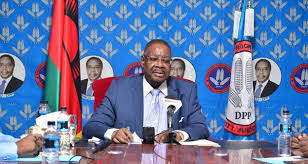It is trite that the periodic struggle against hunger in Malawi has once again resurfaced as the country grapples with maize shortages due to 2023/2024 growing season floods and dry spells that devastated the 2024 harvesting season.
Yesterday, the opposition DPP’s president Peter Mutharika addressed the public, propelling assorted allegations including that the government is doing nothing to help the starving population.
But Mutharika’s insincerity was too loud in his own voice given that the incumbent administration is doing far much a lot in addressing the situation compared to his own inactions in a similar situation in 2016 when Mutharika was the state president.
In June 2016, Mutharika told the hunger-starving Malawians to eat mice and grasshoppers to cope up with hunger, because his government couldn’t offer any relief help. This was a time when the country was facing acute shortage of maize as a result of floods and dry spell that affected harvests in the preceding year. The response was so strange and not befitting of a leader of a nation such that it shocked international news outlets like Aljazeera and BBC who both carried the news on their platforms, reducing the leadership of our country into a laughing stock.
In marked contrast to Mutharika’s tenure, President Lazarus Chakwera has stepped up with swift aid measures aimed at supporting the millions of Malawians facing food insecurity. The immediate response from Chakwera’s government includes the distribution of maize through the Department of Disaster Management Affairs (DODMA) to affected communities across the nation.
Furthermore, President Chakwera declared a state of disaster and reached out to Malawi’s development partners, resulting in vital assistance from the World Food Programme (WFP), which is also providing food aid to struggling families.
These proactive measures have drawn a stark comparison to Mutharika’s leadership, particularly in light of his controversial suggestion during the 2016 hunger crisis, where he told starving Malawians to consume mice and grasshoppers due to a lack of government support. This statement attracted widespread international media ridicule and highlighted the dire state of leadership under his administration.
Yesterday, Mutharika attempted to criticize the current government, suggesting that it has not done anything to alleviate the ongoing hunger crisis. However, many observers believe that his claims are not only bold but desperate, given his track record of failure to address similar issues during his presidency.
In an attempt to explain his total failure, Mutharika’s excuse then was that the government was broke. Surprisingly, yesterday, Mutharika raised his neck and face to assert a claim that his government managed the economy well, stating that his government managed inflation. His so-called managed inflation rate, however, could not translate into anything on the ground, confirming allegations that during his tenure, the Reserve Bank of Malawi under the leadership of his cousin, Dr. Dalitso Kabambe, was cooking and misrepresenting figures in reports that were issued to the International Monetary Fund (IMF).
While still on the issue of inflation, Mutharika, in his address failed to recognize that based on November 2024 statistics, inflation has started dropping, from 32% to 28% showing that slowly but surely the economy is getting out of the woods where they were driven by his own deceptive administration. And guess what, the distribution of free food to the starving populations has significantly accounted for this inflation drop.
Vindicating Mutharika’s assertion that Malawi was broke during his tenure as a result of massive theft and looting from government coffers, parastatals like ESCOM couldn’t afford health cash flow resulting into chronic blackouts. Mutharika anticipated Malawians to have forgotten about all this, hence was bold enough to call journalists to broadcast his lies.
The Chakwera administration is also focusing on long-term solutions to food insecurity, such as enhancing irrigation farming through micro-loans offered by the National Economic Empowerment Fund (NEEF). This initiative aims to strengthen agricultural output, diversify food sources, and ensure national food security. Coupled with the establishment of cooperative farmer clubs and the development of agricultural mega-farms, the Chakwera government is making strides toward improving Malawi’s agricultural landscape and fortifying its export capabilities.












